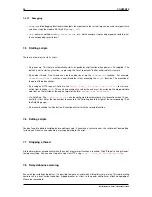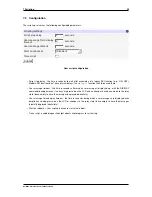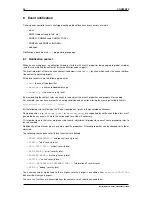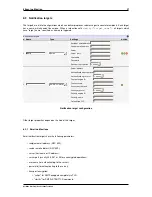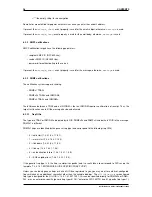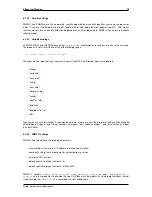
8 Event notification
29
8.2.3.2
Security settings
SNMPv1 and SNMPv2c use the 'community' security model which essentially identifies users by a shared secret
which is sent over the network in plain text ('public' and 'private' being the most popular 'secrets'). That means
that they are very insecure and shouldn't be deployed over an untrusted network. SNMPv3 has a more reasonable
security model.
8.2.3.3
Variable bindings
All SNMP TRAPs and INFORMs accept the
snmp_values
event property to send extra values in the message.
The property, if not nil, must be an array of the following shape:
{{oid1,value1,type1},{oid2,value2,type2},...}
The order may be important; you may want to consult the MIB. The following types are supported:
• "integer",
• "unsigned",
• "counter32",
• "string",
• "hex string",
• "decimal string",
• "nullobj",
• "objid" or "oid",
• "timeticks",
• "ipaddress" or "ip",
• "bits".
Type names are case-insensitive. A type may be omitted, in that case it will be inferred (nil values will be encoded
as null objects, strings as octet strings, numbers as integers, "true" values as integer 1, and "false" values as integer
2 as per SMIv2).
8.2.3.4
SNMPv1 settings
SNMPv1 trap targets have the following parameters:
• server address (hostname or IP address of management station),
• community string (the shared secret for authentication to server),
• enterprise OID (number),
• default generic trap type (number 0..6),
• default specific trap type (number 0..2147483647).
SNMP v1 accepts
snmp_enterprise_oid
,
snmp_generic_trap_type
and
snmp_specific_
←
-
trap_type
event properties to override the trap OID; they must be integers or string representations thereof.
It also accepts the
snmp_values
event property as described
above
.
DLI DIN4 User’s Guide: 20170809T111540Z
Содержание DIN4
Страница 1: ...DLI DIN4 User s Guide 20170809T111540Z ...
Страница 57: ......










